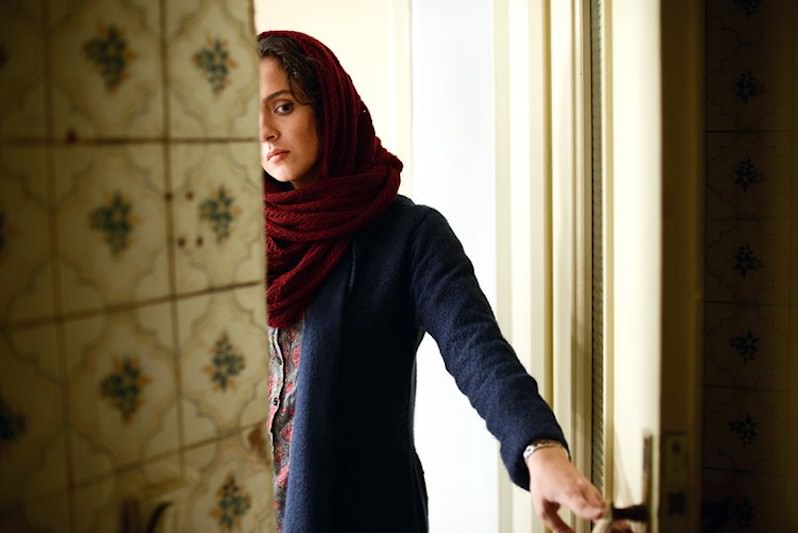‘The Salesman’: An Iranian Domestic Drama With a Dash of Arthur Miller
Oscar-winning filmmaker Asghar Farhadi is back in the awards mix.
Taraneh Alidoosti is the lead actress in director Asghar Farhadi’s “The Salesman,” which mixes characters’ on- and off-stage relationships. (IMDb)
With the release of “A Separation” in 2011, Asghar Farhadi became the first Iranian ever to win the best foreign film Oscar. It was a noteworthy accomplishment in a climate where fellow filmmakers like Abbas Kiarostami lived and died in exile, and Jafar Panahi continues to work under restrictions on foreign travel.
Normally, the best way to avoid government harassment is to make either propaganda or pabulum. Like Panahi and Kiarostami, Farhadi does neither. In interviews as well as on the big screen, he is true to his convictions, painting complicated portraits of people striving in a complicated world, while avoiding conflict with government censors.
His latest, “The Salesman,” focuses on married couple Emad (Shahab Hosseini) and Rana (Taraneh Alidoosti), who are forced to abandon their Tehran apartment building when it becomes unsafe due to construction next door. Luckily, they find a new apartment, but the former tenant is a prostitute who attracted the kind of attention and company that the neighbors still complain about.
Her belongings fill a room — assorted items, dresses in the closet, a child’s crayon drawings on the baseboard. Farhadi makes the woman’s presence palpable not by lingering on the items, but on Rana’s reaction to them — just one example of what sets him apart as a director of character drama.
Emad works as a high school English teacher during the day and at night performs with Rana in a small theatre production of Arthur Miller’s “Death of a Salesman,” which we see in snippets. When a classic is singled out in a movie it’s usually for a reason, but in this case it remains unclear what that reason is until the film’s end.
At home alone one night, Rana is showering when she is attacked by a home intruder. She suffers a nasty blow to the left eye, but beyond that she cannot recall the encounter, only that she wasn’t raped. Coping with Rana’s reaction to the trauma and how it impacts her relationship with Emad makes up the first hour of the movie. Outstanding performances by Hosseini and Alidoosti are eminently engaging, but with no real progress toward solving the mystery, pacing becomes problematic.
Emad finds a wad of money on a shelf along with a set of car keys. Rana prefers not to go to the police, but for Emad there are too many unanswered questions. What kind of attacker leaves money and his car keys? And what’s the real reason Rana doesn’t want to involve the police? And what kind of man cannot protect his wife from other men?
Emad tracks the truck to its owner and exacts his revenge, throwing into doubt who the real victim is, as well as completing the connection with Miller’s play, though in an unsatisfying way.
Farhadi has worked with Hosseini and Alidoosti previously on “About Elly,” where the two are introduced by friends on a weekend getaway. Reunited with Farhadi for “A Salesman,” they enjoy a deceptively easy chemistry. Alidoosti is a wide-eyed beauty with an expressive face whose talent transcends her looks, enabling her to believably transform into an average woman. In her gifted hands, Rana’s struggle becomes psychology in action — when she recoils before climbing behind the wheel of her attacker’s truck, we can read her thoughts.
Even as Emad attempts to nurse his injured wife, he is going through his own crisis. Hosseini makes him easy to identify with as an everyman with an unyielding urge to get to the bottom of things. He plays him as sober and rational throughout most of the movie, but beneath his heroic purpose is the unacknowledged guilt of ignoring Rana’s desire to forget about the incident. Upon learning the truth about his wife’s attacker, his reaction is overstated, but Hosseini’s elegant performance transcends the screenplay’s shortcomings.
Farhadi places his performers in everyday settings, mostly real-life locations rather than studio sets. His style is naturalistic, often employing long, handheld takes without resorting to visual slickness. Like his camerawork, his edits are used to punctuate, rather than to scintillate.
Compared to “A Separation,” “The Salesman” has equally compelling characters, only the themes are less focused and the subtext less pointed. But none of these are reasons not to see the new film. Farhadi is a master of his craft, a nuanced chronicler of the human condition, whose work unfailingly offers moments of truth and beauty.
Independent journalism is under threat and overshadowed by heavily funded mainstream media.
You can help level the playing field. Become a member.
Your tax-deductible contribution keeps us digging beneath the headlines to give you thought-provoking, investigative reporting and analysis that unearths what's really happening- without compromise.
Give today to support our courageous, independent journalists.








You need to be a supporter to comment.
There are currently no responses to this article.
Be the first to respond.